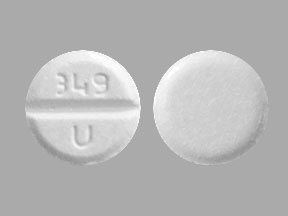Allopurinol Disease Interactions
There are 4 disease interactions with allopurinol.
Allopurinol (applies to allopurinol) bone marrow suppression
Moderate Potential Hazard, Moderate plausibility. Applicable conditions: Bone Marrow Depression/Low Blood Counts
Bone marrow suppression has been reported in patients receiving allopurinol; however, most of these patients were receiving concomitant medications with the known potential to cause such an effect. The suppression has occurred from as early as 6 weeks to as long as 6 years after the initiation of allopurinol therapy. Therapy with allopurinol should be administered cautiously to patients with or predisposed to bone marrow suppression.
Allopurinol (applies to allopurinol) dehydration
Moderate Potential Hazard, High plausibility. Applicable conditions: Diarrhea, Vomiting
Patients with pre-existing kidney conditions, including chronic kidney disease or a history of kidney stones, may be at increased risk for worsening of kidney function or acute kidney injury due to xanthine calculi during treatment with this drug. Ensure adequate hydration to maintain a daily urine output of at least 2 liters in adults and 2 liters/m2/day (or 100 mL/m2/hour) in pediatric patients. Maintaining a neutral to slightly alkaline urine pH is also recommended to prevent xanthine calculi and reduce urate precipitation. Renal function should be closely monitored, especially during the early stages of therapy.
Allopurinol (applies to allopurinol) liver disease
Moderate Potential Hazard, Moderate plausibility.
Allopurinol may cause hepatotoxicity. In patients with pre-existing liver disease, monitor liver enzymes periodically during the early stages of therapy. Discontinue treatment in patients with elevated liver enzymes.
Allopurinol (applies to allopurinol) renal dysfunction
Moderate Potential Hazard, High plausibility.
Allopurinol and its primary active metabolite, oxipurinol, are eliminated by the kidneys, and any changes in renal function will likely increase exposure. Additionally, treatment with allopurinol may result in renal impairment due to formation of xanthine calculi or due to precipitation of urates in patients receiving concomitant uricosuric agents. Patients with pre-existing renal disease, may be at increased risk for worsening renal impairment due to xanthine calculi or precipitation of urates while receiving treatment. These patients require lower dosages of allopurinol than normal to control serum urate levels and close monitoring of laboratory parameters of renal function to reassess the patient's dosage. Treatment with allopurinol tablets has not been studied in pediatric patients with severe renal impairment (eGFR less than 20 mL/min) or on dialysis.
Switch to professional interaction data
Allopurinol drug interactions
There are 436 drug interactions with allopurinol.
Allopurinol alcohol/food interactions
There is 1 alcohol/food interaction with allopurinol.
More about allopurinol
- allopurinol consumer information
- Check interactions
- Compare alternatives
- Pricing & coupons
- Reviews (91)
- Drug images
- Side effects
- Dosage information
- Patient tips
- During pregnancy
- Support group
- Drug class: antigout agents
- Breastfeeding
- En español
Related treatment guides
Drug Interaction Classification
| Highly clinically significant. Avoid combinations; the risk of the interaction outweighs the benefit. | |
| Moderately clinically significant. Usually avoid combinations; use it only under special circumstances. | |
| Minimally clinically significant. Minimize risk; assess risk and consider an alternative drug, take steps to circumvent the interaction risk and/or institute a monitoring plan. | |
| No interaction information available. |
See also:
Further information
Always consult your healthcare provider to ensure the information displayed on this page applies to your personal circumstances.


